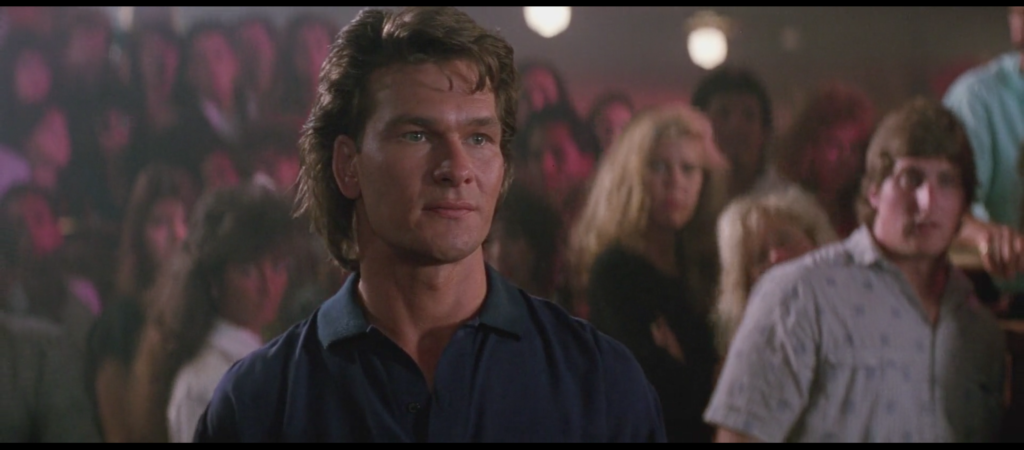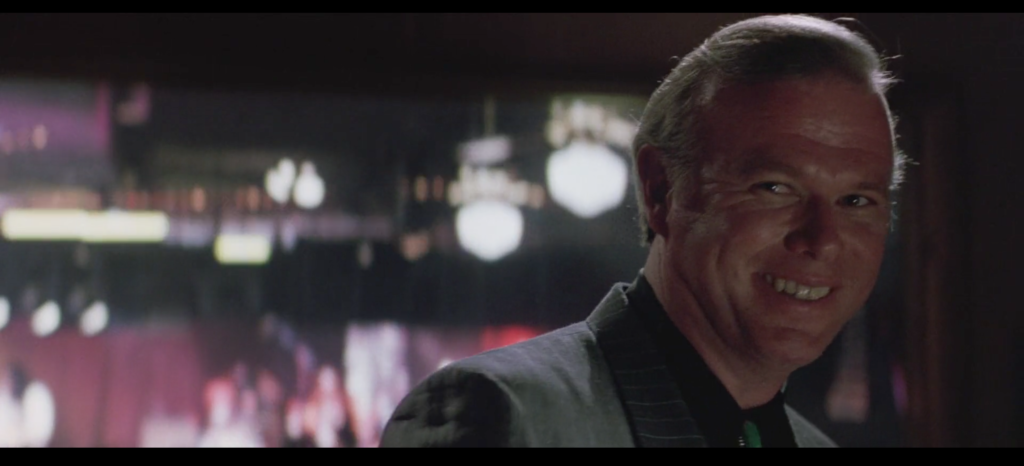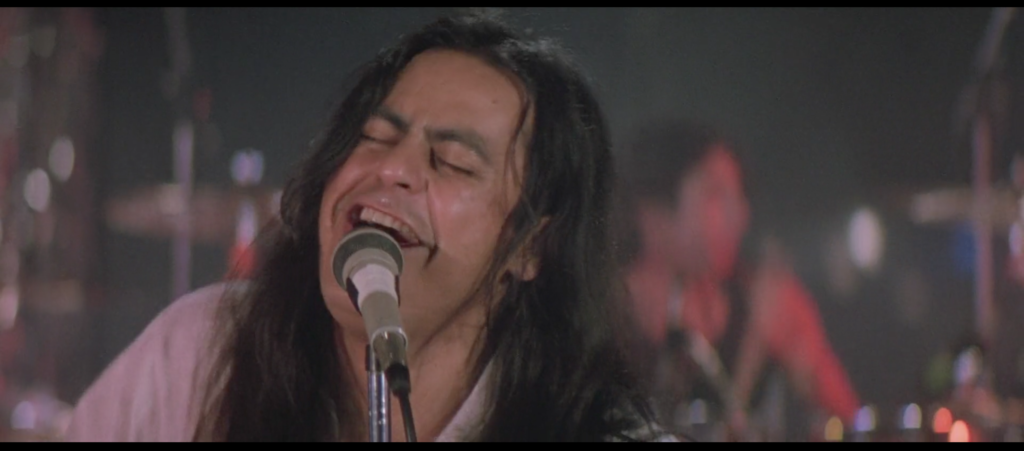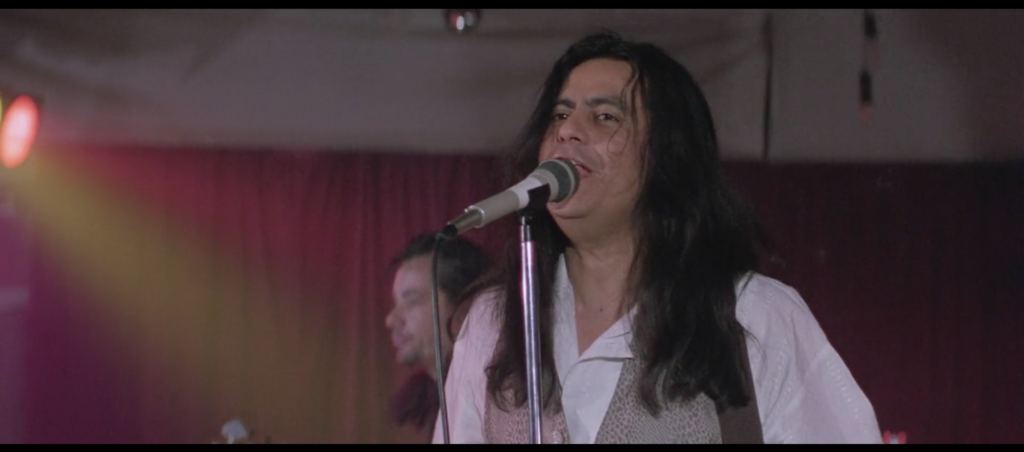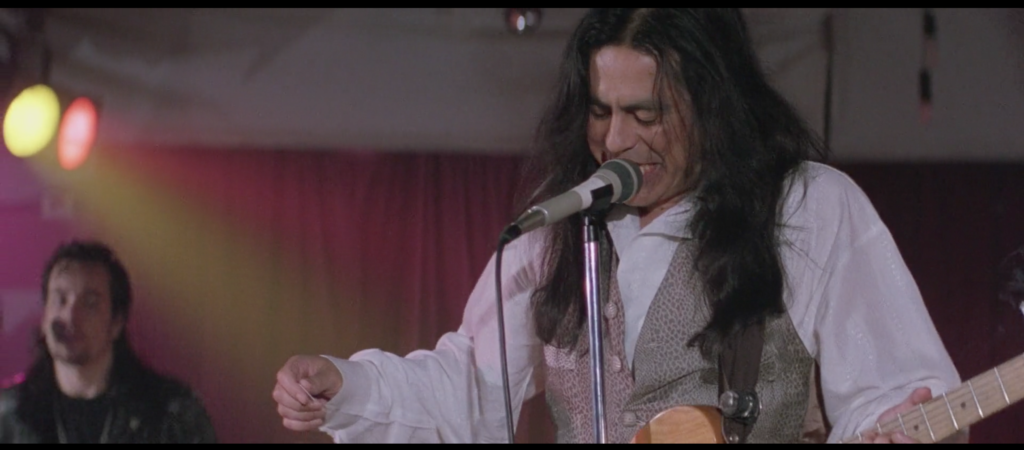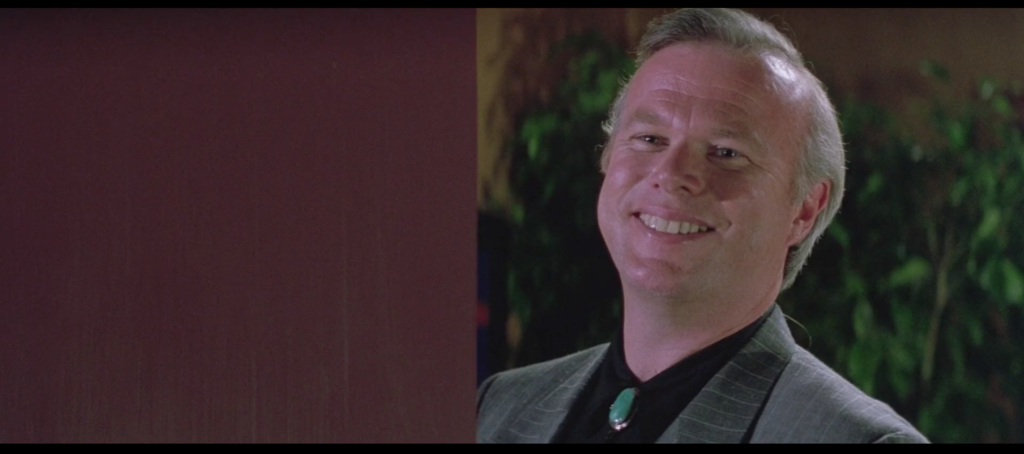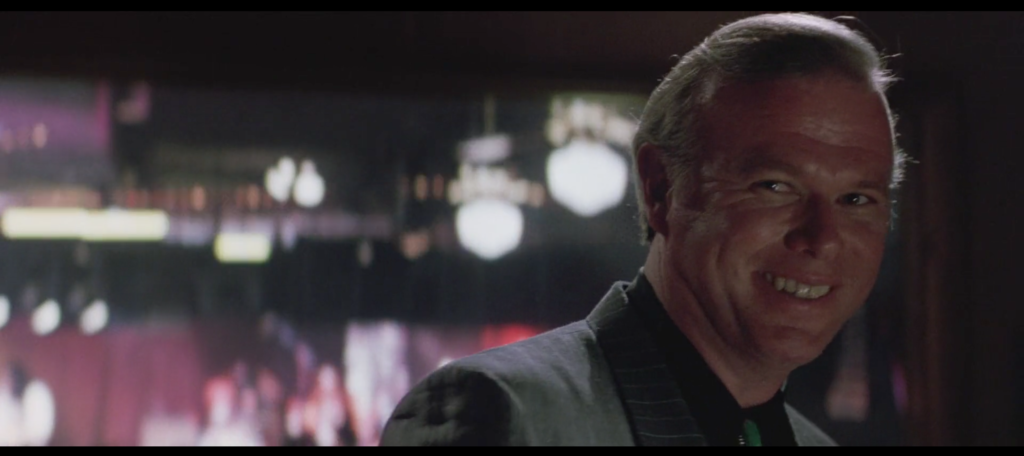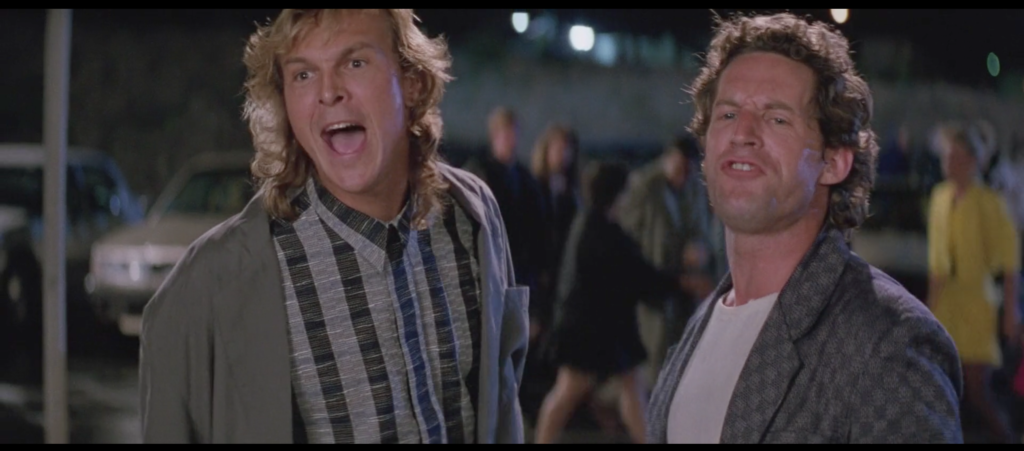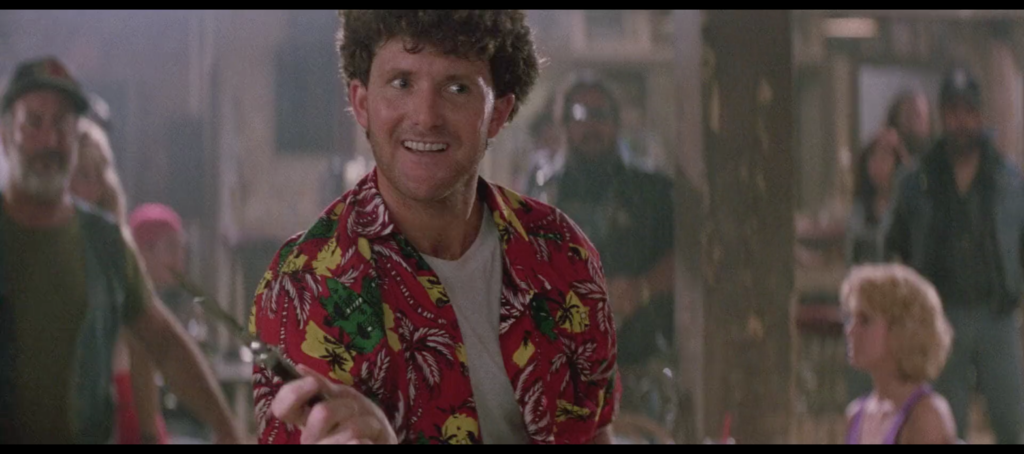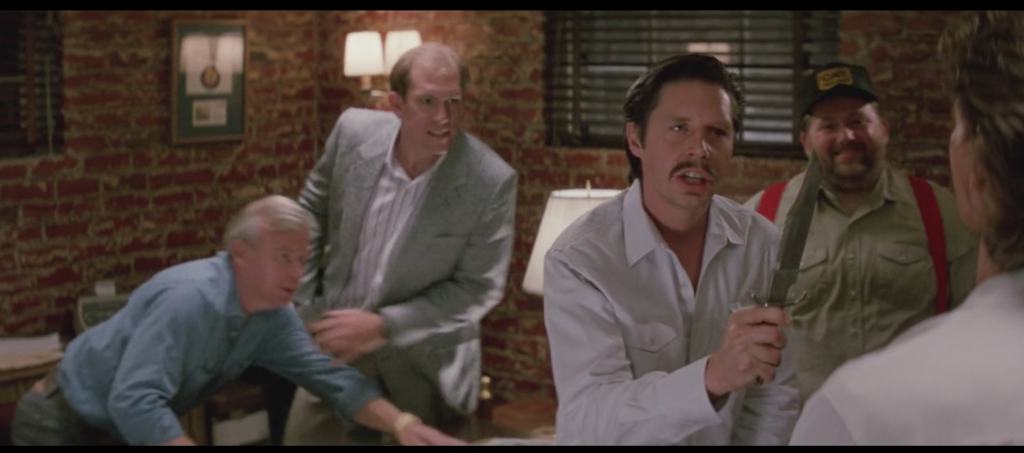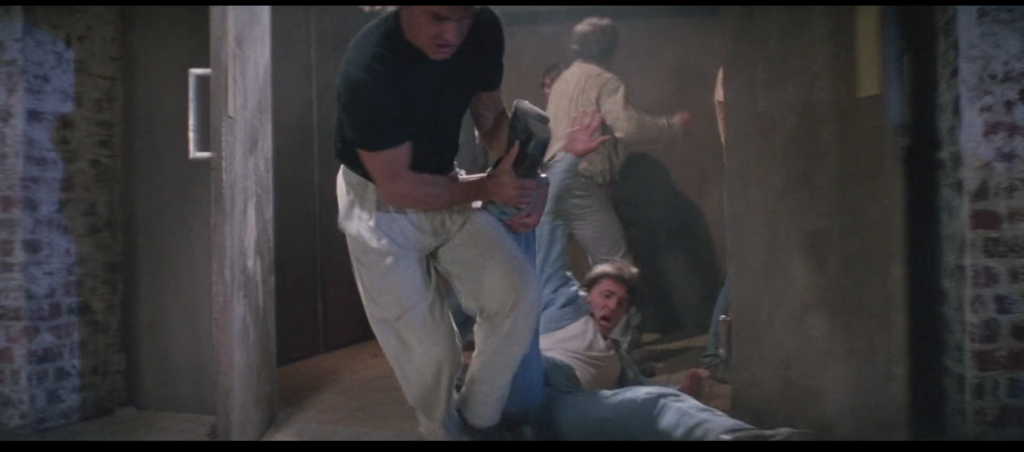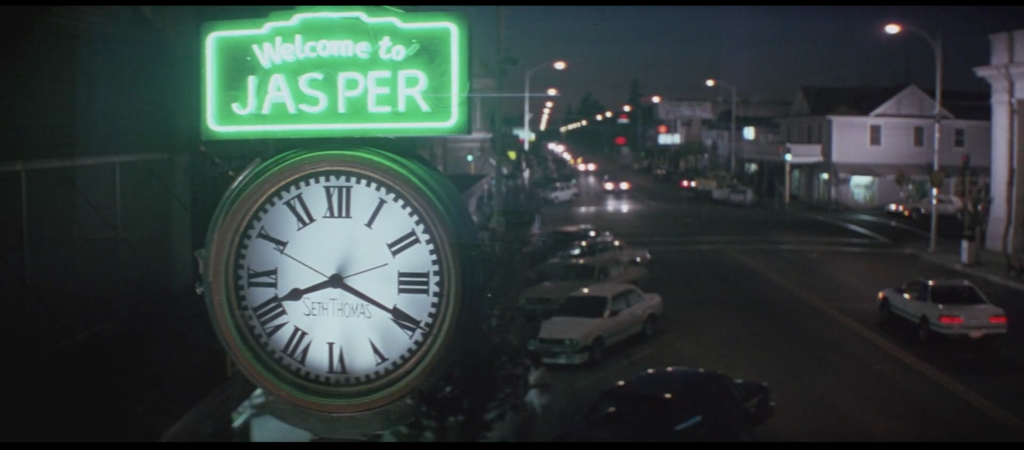Posts Tagged ‘bandstand’
185. “I think it’s time for you gentlemen to leave”
July 4, 2019“I think it’s time for you gentlemen to leave” is the first thing we hear Dalton, the second greatest cooler in North America, say in Road House, the film about him. I’m ashamed, however, to say that it’s taken me over half a year to write about it. To paraphrase George Harrison on Ringo Starr, the phrase looms large in his legend.
There’s a reason I avoided specifying the sentence’s terminal punctuation, and it’s because Patrick Swayze’s line reading defies our understanding of the very concept of the sentence. “I think it’s time foryougentlemen to leave“: Dalton walks up to the scene of a Knife Nerd disturbance and these words come spilling out of his mouth in a controlled burst. “I think it’s time“: Face stoic, he leans hard on the last word, letting them know the time has come for…something; “foryougentlemen”: It comes out like a child sayin “LMNO” in the middle of the alphabet, as if “gentlemen” is but a courtesy he’d just as soon skip past; “to leave“: the initial “t” is hard, the tip of the tongue taking a trip of two goons down the palate to tap, at “to,” on the teeth, and then right into “leave,” emphasis his, the message clear, get the fuck out before he stops calling you gentlemen, you don’t have much time left.
The delivery is magnetic, engaging, evocative of the entire Dalton persona that awaits us, commanding yet polite yet petulant, tremulous with suppressed violence and the strain of high ideals, ready to be peeled back, layer by layer, like an onion, like a daydream, or a fever.
097. “Anyway, I’ve come into a little bit of money.”
April 7, 2019Frank Tilghman has just met Dalton for the first time, after what one assume is years of hearing tell of his exploits from other barfolk. He explains he runs a little nightclub called the Double Deuce just outside of St. Louis. It used to be a sweet deal, he says. Now it’s the kind of place where they sweep up the eyeballs after closing, he laments. His face falls, ashen. He looks out over the bustling crowd at the Bandstand, the club where Dalton currently works, but it’s as if he doesn’t see it at all. Then he turns back toward Dalton and, with the most normal facial expression imaginable, he says “Anyway, I’ve come into a little bit of money.”
Oh, is that a fact?
In the past, when fleshing out the romantic backstory between Tilghman and Pat McGurn, I’ve theorized that one of Tilghman’s ex-wives’ doting mother left him a small fortune, having turned out to be much fonder of her daughter’s former husband than the daughter ever was. Perfectly harmless. I’ve also speculated that he was involved in one of those “seduce an old lady, get written into her will, and dump her overboard during a cruise” schemes, like Not Great Bob’s boyfriend did (allegedly) in Mad Men. You have to admit it’s possible.
But look at that grin again. Look at that rictus of arrogance and cruelty. This is the face he’s choosing to display to a man he’s going to spend top dollar on, a man who will turn the struggling Double Deuce into the hottest nightspot in a hundred miles, a man who will run the bad element out of the bar, a man who will almost singlehandedly destroy the organized crime ring run by the richest man in Jasper. Until he dies, that is, slain in the course of the battle with Dalton.
Slain by Tilghman.
The new richest man in Jasper.
You know the 7-Eleven, the Fotomat, the mall, christ, the JC Penney? Brad Wesley brought them to town, he says, and no one contradicts him. But if I were Dalton, I’d spend some of my mid-six-figure yearly salary on a forensic accountant. Shell corporations within shell corporations within shell corporations are involved, I’d imagine. And what address is listed for those corporations, in the end? Whose name is on the dotted line?
Cui bono?
081. Don’t Throw Stones
March 22, 2019The most important thing the opening sequence of Road House wants to convey to you is not to throw stones. “Don’t throw stones,” says the man on stage at the Bandstand. “You don’t know,” he continues. “It’s not what you say, it’s what you do,” he elaborates. He then repeats for emphasis “Don’t throw stones” to conclude his statement.
Why this happens is…ah, one of the great mysteries of Road House, right up there with beginning the film in a bar that is not the titular road house, or even a road house at all.
It’s not like the man singing “Don’t Throw Stones” is Jeff Healey, lead singer of the Jeff Healey Band, who provide the live music in every subsequent scene with live music. He’s Tito Larriva, lead singer of Cruzados, the band playing here, and he’s a pretty interesting cat in and of himself, a human Wikipedia k-hole. He started his musical career as lead singer of the Plugz, an LA punk band from the general Decline of Western Civilization/Love and Rockets milieu who did the original score for Repo Man. Much of the band subsequently morphed into Cruzados, which played up their Latino roots and made a kind of Eighties coke-bloat blooz-rock thing out of it. After their breakup, Larriva eventually formed Tito & Tarantula, who provided the musical accompaniment to the Salma Hayek snake dance in From Dusk Till Dawn. Various members of the Plugz/Cruzados continuum also played with Bob Dylan on Letterman in ’84, the drummer played for Izzy Stradlin & the JuJu Hounds, Social Distortion, and Mike Ness’s solo band, and the bassist has worked with Matthew Sweet for years as well as doing various things with sundry rock and roll legends. How they wound up here has, I assume, something to do with the golden ears of music-industry macher Jimmy Iovine, founder of Interscope, co-founder of Beats by Dre, dater of Stevie Nicks, partial inspiration for “Edge of Seventeen” via his intense grief over the murder of his friend John Lennon, and billionaire, married to Liberty Ross, who’s the sister of Atticus Ross, who’s the songwriting partner of and second-ever official member of Nine Inch Nails with Trent Reznor, who once opened for Izzy Stradlin’s other band Guns n’ Roses and who co-starred with Repo Man‘s Harry Dean Stanton in Twin Peaks: The Return and spent years recording for Iovine’s label Interscope before eventually being named chief creative officer of Beats Music, which became Apple Music after Iovine and Dr. Dre sold it to Apple and became billionaires. It’s a small world after all.
<Al Swearengen voice> Anyways, </> Larriva’s face is the second face you see in close-up in Road House, beaten to the punch only by Kevin Tighe. This is an interesting first foot to put forward, not only because Tighe and Larriva’s looks are <Fifty Shades of Grey meme voice> unconventional </a>, but because Larriva isn’t even in the movie after this first scene. But Road House is a film that plays its cards close to its chest in the early going, primarily because despite the skill of the team of action-movie aces employed to make it look good, it’s written (in part by Academy Award nominee Hilary Henkin) as if the writers were randomly but repeatedly struck on the head during the process, resulting in wild miscalculations of the relative weight of what is shown on screen. The Four Car Salesmen of Jasper, Missouri are one result. Using Frank Tilghman as our entry-point character even though he’s a grinning ghoul in a bolo tie who could only read as more villainous if huffed fumes and said “baby wants to fuck” is another. Centering the whole opening sequence on a band that you’ll never see again is another.
And there is simply no way to overlook or underplay the presence of the band in this sequence, no. They won’t let you. Our first good look at Larriva, in a vest and pirate-look shirt that are striking even given the Road House fashion baseline, involves him screeching, and I mean it sounds like someone just low-blowed him, “IF YOU LOVE ME BUY ME A BIG TEE VEEEEEE” at the top of his lungs and the top of his register. He goes so hard and so high on this he literally stands on tiptoes and sings down into the mic. He coils his face back into his neck like a snake whose strike is sonic rather than physical. This requires effort, and it does not look like a pleasant effort either. So you know, kudos to Larriva and Cruzados. They left it all out on the stage, a stage they were placed on for some reason.
Now when you first watch Road House you may not realize it, but the message espoused by this song will get under your skin. I’ve found myself singing “Don’t throw stones” around the house. I’ve heard my partner doing the same. We’ve used it as shorthand for watching Road House at all, the way couples text “COAT” at each other to find out if they’re going to get laid if they come home instead of staying out with their friends.
What I’m getting at as this: This sequence is superfluous, its content is a non sequitur (not throwing stones is part of neither the Dalton Path nor the Wade Garret Way), the time spent with it is unpleasant, and the lingering impression is endearing. And here’s the thing about that as it applies to Road House, according to J.R.R. Tolkien, author of The Lord of the Rings:
“I cordially dislike allegory in all its manifestations, and always have done so since I grew old and wary enough to detect its presence. I much prefer history – true or feigned– with its varied applicability to the thought and experience of readers. I think that many confuse applicability with allegory, but the one resides in the freedom of the reader, and the other in the purposed dominion of the author.”
064. I Thought You’d Be Bigger Vol. 1: Tilghman
March 5, 2019At the end of their first encounter Frank Tilghman tells Dalton “I thought you’d be bigger.” This is Road House‘s primary recurring joke; you’ll hear it two more times from two other people. It’s probably swiped from everyone telling Snake Plissken “I thought you were dead” in Escape from New York, for what it’s worth. It’s a groaner, and it’s endearing in its groanerness over time.
It is also a weird thing to say to someone you just met. It’s a weird thing to say even if they’re a person whose job is usually associated with being of a certain size. Imagine meeting a professional wrestler or basketball player and saying that: You can picture the mechanical smile and hear the canned response already, right? Because chances are it’s not the first time the person in the job usually performed by a bigger person has been made aware that they are, comparatively speaking, smaller. It’s more likely that they’ve thought about this for literally decades, like since they were in first grade, than that this charming bit of banter will catch them delightfully unawares.
Frank Tilghman is a weird guy, though, whether by design or by Kevin Tighe’s inability to play him any other way. (A reader I’ve since argued with because I think it’s more likely Steven Spielberg has cinema’s best interests at heart than Netflix does suggested he auditioned for the Brad Wesley part, got Tilghman instead, and simply decided to play the role as Brad Wesley anyway, and it’s a damn good theory.) If you could dress a leer up in a bolo tie, that’s Frank Tilghman. He looks like a police sketch based solely on an eyewitness saying “He was some kind of pervert.” If you can watch him during the opening of this movie and not assume he’s the villain of the piece, I think that constitutes a Turing test failure.
Nevertheless he is one of the good guys, he has no ill intent toward Dalton, at no point does he do anything to antagonize or undermine or bamboozle or even overtax Dalton during his employment at the Double Deuce. This only makes “I thought you’d be bigger” even weirder.
Yet the way he says it is the weirdest thing of all, way more than the mere fact of saying it. He’s closes a deal bringing the best young cooler in the nation into the fold for a cool mid-six-figure salary, with no set start date. He does this while watching Dalton a) stitch himself up from a knife wound Tilghman also watched him incur minutes earlier, and b) summarily quit his current job while treating the owner of the bar he’d worked in like dogshit. And what does he do on his way out the door but pause, flash that unmarked-van grin, and say “You know, I thought you’d be…bigger.” The ellipsis represents a pause so pregnant with implication and innuendo its water is breaking, and the emphasis on bigger is definitely in the original, and did I mention he literally looks Dalton’s shirtless body up and down as he says this?
Now then. Do we have reason to believe Tilghman lusts after Dalton? Yes: Dalton is reason enough for anyone to lust after Dalton. Do we have reason beyond that? Yes: My theory that he and Pat McGurn were at one time involved romantically for one thing, or my other theory that the mysterious fortune he’s suddenly come into that allows him to renovate the Double Deuce and hire Dalton to keep the place secure came from an old rich widow he seduced as a closeted gigolo, persuaded to change her will to make him her sole beneficiary, and then tossed over the railing of a cruise ship, like the “Not great, Bob!” storyline from Mad Men, would (if true) indicate he is attracted to men and also makes destructive decisions in that regard. Are we intended to read his “I thought you’d be…bigger” as both a come-on and a sexualized dick joke? Yes: Our eyes and ears are not lying to us.
Do we need to respond with the kind of gross shitty gay-panic laffs we might have expected from movies and audiences alike for decades prior to this film’s release and at least a couple decades after it? No! The proper way to respond is this. First, to paraphrase RiffTrax’s Mike Nelson, the question of whether Kevin Tighe is trying to bed down Patrick Swayze, or the character equivalents of same, is a fascinating one on its face. It’s like when you learn Kate Beckinsale has a kid with Michael Sheen, which many people just learned when they also learned Kate Beckinsale is fucking Pete Davidson, the Saturday Night Live lotto winner who was previously fucking Ariana Grade. “A lot going on here,” I believe is your American expression, yes?
Second, and more importantly, this is a workplace safety issue, because Frank Tilghman absolutely is sexually harassing his new employee here before his first day on the job! Frank Tilghman may be on the side of the angels where the larger war for the soul of Jasper, Missouri is concerned, but he is without question an awful boss. Remember that before Dalton, Tilghman’s hires (that we know of) include two Brad Wesley goons and an extremely surly and obvious coke dealer and a guy who allows teenagers into the bar so he can have sex with them. The fish rots from the head.
Seen in this light, “I thought you’d be…bigger” becomes more than a come-on or a dick joke. It’s a cry for help. Frank Tilghman knows the magnitude of the task ahead of him—not cleaning up the Double Deuce, that’s just a metaphor, but cleaning up Augean stables of his very soul. To Tilghman, that is Dalton’s true task. Beneath the clumsy curiosity about his new hire’s penis lies the real question: Is he man enough to make me whole?
029. Knife Nerds
January 29, 2019A person watching Road House from a remove of decades could be forgiven for wondering if packs of pointy-faced dorks with switchblades, roaming the land and stabbing bouncers, were the subject of some sort of ginned-up panic along the lines of Satanic nursery schools and wilding superpredators. No fewer than four blade-wielding wieners try to slice up Dalton before the film is even halfway over. Though as a category they are a distant second to brawlers in terms of goon prominence, they bear examination for what their presence tells us about Dalton’s world.
These two nitwits are the first people in the film to get bounced, from the Bandstand, before Tilghman hires Dalton away from the place to come work at the Double Deuce. The fellow on the right sparks a bounceable incident when he attempts to pay for the attentions of a young woman who finds the offer insulting and pins the hundred-dollar bill he offers her to the table with a knife; he knocks over her chair by planting a kick right between her legs and we’re off to the races. Dalton thinks he and his men have cooled things off, but this weaselly goof yanks the knife right back out of the table and takes a slice out of the cooler’s arm the moment his back is turned. He and his friend Farrah Fawcett are taken outside by Dalton and company, thinking they’re about to throw down with the man himself. (“I’ve always wanted to try you,” says the knife nerd to Dalton prior to exiting the premises. “I think I can take you.” This is another essay entirely.) But their date with immortality is cancelled when Dalton just turns around and goes back inside. They hurl invective at him in an effort to rile his temper or shame him into combat, but not even such vicious insults as “dirtball” and “moose-lips,” which are things these two people yell at the top of their lungs at a man they’re trying to intimidate, can change Dalton’s mind. Later, Dalton will caution the staff of the Double Deuce against taking such insults personally, since they’re just “two nouns combined to elicit a prescribed response.” That knowledge is clearly hard-earned.
This beady-eyed Parrothead is the first person Dalton bounces from the Double Deuce, earning him the undying awe of the people there assembled. All he wants to do is watch his girlfriend dance on a table. Such a fan of her gyrations is he that he attempts to murder, with a knife, the bouncer who asks them to cut it out. “Motherfucker” is his preferred binominal, but what he lacks in creativity he makes up for in extremely loud shirts. Dalton breaks a table with his face, and thus the cooler’s head prevails.
Here’s our old friend Pat McGurn, Brad Wesley’s only sister’s son and the Double Deuce’s now-ex bartender. He’s returned with his fellow goons Tinker and O’Connor in tow to muscle Tilghman into rehiring him, lest Wesley shut down liquor distribution to the bar. When Dalton takes mild, even bemused issue with the idea, Pat whips out a monstrosity that looks like something Legolas would pull out of an Uruk-Hai before lobbing it into another one’s forehead. As he attempts to stab Dalton in the fucking face in front of multiple witnesses in a crowded bar that can be observed clearly through the glass window of the office in which the murder attempt is taking place, he calls Dalton “chicken-dick.” In the end it works out no better for him than it did for Store Brand Crockett and White Tubbs or Hawaiian Punch, but I’m pleased to note that he at least came up with the film’s most ridiculous insult.
For the purposes of this essay I almost didn’t count Ketchum, the unnamed and fundamentally anonymous Brad Wesleyan who drives the monster truck and for whom bladed weapons are a specialty, as we will later learn to tragic effect. Though he is an obnoxious prig, he actually seems like someone you’d think twice about getting in a fight with. That ought to—ought to—elevate him out of Knife Nerd territory. On the other hand, his first knife attack involves attempting to high-kick Dalton in the head with a blade embedded in the toe of his cowboy boot, one of the lamest attempted murders in the movie, and it’s not like the competition isn’t stiff. Dalton catches his leg in midair, twists it savagely, and drags the guy out of the bar on his ass, which he proceeds to kick. Ketchum may look tough. He may even be tough. He doesn’t call Dalton “shit-ass” or “poodle-sack” or anything. But watch him dragged out to the curb like so much stonewashed garbage and then deny the Knife Nerd within at your peril.
All of these men use the blade as surrogate bravery. They may talk a good game—alright, they may talk a game. But when push comes to shove, they attempt to stab. They can whip out whatever they want in their attempt to try and take Dalton. But Dalton’s blade is his body, honed to a nicety, and it will wind up inflicting a far more serious gash than any knife before the story is through. A true cooler is worth a hundred such cowards.
021. Welcome to Jasper
January 21, 2019
It would be incorrect to say that the “Welcome to Jasper” sign situated atop a clock in the town’s main thoroughfare is the sight that greets Dalton when he first drives into town, because he’s driving into view from the opposite direction. This leaves us with two possible interpretations. Either he’s driven clear across town from one end to the next just to take the place in and we’re catching up with him as he hits the opposite border from where he started, or this sign is an ad hoc affair in a shot the logic of which was not exactly thought through by the film’s director. Considering the strange effect cars seem to have on the amount of sense the movie makes at any given time I lean towards the latter interpretation.
Be that as it may, I hope Dalton caught it in his rearview mirror as he passed by, because it tells him a lot about the town, and the main body of the movie, he’s about to enter. The bright green neon signage is an unusual choice, either for a border marker or for a greeting from the town’s main shopping district. It evokes the neon of the Bandstand sign more than the wooden billboard paid for by the local Rotarians. That, at least, I believe was intentional on the part of the filmmakers. You are entering a Road House town.
The neon itself rests atop a tony-looking Seth Thomas clock. The same manufacturer created the clocks that greet travelers in Grand Central Station. It’s emblematic of both a bygone time and the promise the future held during that time, a past-future when it was possible to go anywhere and be anyone. The neon, too, has its own retro connotations, more sock-hop than Beaux-Arts. They don’t match up.
The combination makes sense only in the context of the film-Jasper’s crazy-quilt approach to authenticity. This is a town of bearded old codgers who raise horses, and also have expensive faux-rustic loft apartments in their barns, located directly across the water from mansions with property big enough for helicopters to land on. It’s the home of countrified fellas named Red who run small auto-parts stores and huge Ford card dealerships, both of which are held up to be models of small-business entrepreneurship against Brad Wesley’s chain-store depredations. It’s a place where one dive bar out of several that we visit can be the stomping ground of a clientele straight out of The Road Warrior one month and a mecca for nightclubbers who pay top dollar to see a blind white boy play the blues the next, predicated on the garish design sensibilities of the bar’s rich owner and the ability of the bar’s cooler to settle all problems in the town with violent force.
And you know that “main thoroughfare” bit? Who knows! I basically made that up, since we never see this place nor anywhere remotely like it ever again. This crowded stretch of commercial development with decent walkability and the network of dirt roads, junkyards, and greasy-spoon diners the rest of the movie traverses have about as much in common as, well, the clock and the neon sign. But each stretch of road broadcasts realness.
Dalton intuits this, which you can see in the way he self-effaces regarding his fancy degree from New York University, but takes the ancient practice of tai chi directly to the shores of Jasper’s lake-river. By turning the sign away from Dalton’s point of view at this early moment, Dalton’s status in the town is left an open question—one quickly answered, true, but that answer is earned. Dalton is welcome in Jasper.
Brad Wesley talks a good game about small-town values and that old time rock and roll, but everything else about him—riding in a chopper, erecting malls, interacting with nature primarily by killing, stuffing, and mounting wild animals from around the world rather than the good ol’ USA—does not. This makes him an interloper, an occupier, a colonizer, someone as out of place in Jasper as a Calvin Klein’s Obsession ad would be below that neon sign and Seth Thomas clockface. Brad Wesley is not welcome in Jasper.
But you are welcome in Jasper, dear viewer. You are welcome here from the start, trusted by the town to take it into your heart in all its complementary contradictions. You must be, because it’s the only way to move forward and drive on to what awaits.

